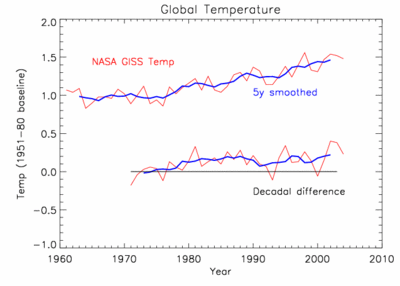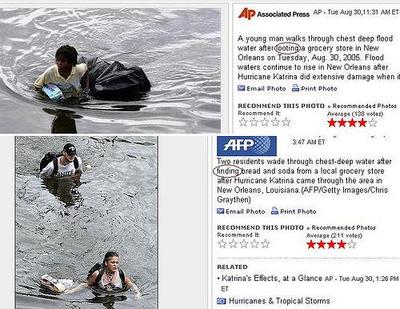It is interesting (to me, at least) to compare the recent disaster in New Orleans to that caused by the earthquake in Kobe 10 years ago. For starters, it looks like both disasters are going to end up with similar human and financial costs (Kobe: 6400 deaths, 300,000 homeless, $100bn losses).
For the background to Kobe, it should be noted that although Japan is a hotbed of seismic activity, this particular area was not considered at risk from earthquakes. Also, following the large-scale damage of the
1994 Los Angeles quake, it was (perhaps rather smugly) claimed by the authorities in Japan that such damage "could not happen here" due to better building standards and preparation. So, when the
Great Hanshin Earthquake destroyed a large part of the city at 5:46am on a January morning, the authorities were rather taken by surprise.
The initial response by the government was widely criticised as tardy. According to
this article, it was 2 hours before the Prime minister was briefed, and it took the Governor of the region 4 hours (!) to ask for the Self-Defence Force. Wow. 4 whole hours, for a large-scale disaster that was completely unexpected (at least in this area). While not perfect, it certainly puts recent events in context...
It did take a day or so for the authorities to swing into action.
These articlesdescribe how over subsequent days there were also bureacratic barrriers to foreign attempts at aid, such as sniffer dogs stuck in quarantine, and foreign medecines considered unsuitable for the unique Japanese consitution. So far, this seems eerily similar in character to the events after New Orleans flooded, although with a significantly more compressed time scale. However, during the initial power vacuum of the official response, private rescue and aid efforts by individuals, NGOs and the yakuza (!) started immediately, and had a substantial impact. It's likely that the Japanese media would have downplayed stories of looting, whereas the US media has probably exaggerated the unrest in New Orleans, but it still seems very clear that there was a major difference between the way the public reacted during the two events.
For obvious reasons, I'm particularly interested in racism and the treatment of foreigners in emergencies. I doubt whether any country with an immigrant population can honestly claim to be free of racism, and Japan is no exception.
[Now for a small digression: although it eventually signed up to the UN convention on racism, Japan has (uniquely in the developed world?) never actually enacted any legislation outlawing such behaviour, which continues to raise its ugly head on occasion. Victims of racial discrimination can in theory seek redress through the civil courts: after
several years of legal battles, they may win compensation, but the authorities do nothing. After the Great Kanto Earthquake of 1923, many foreigners were murdered by mobs - some say
with the collusion of the authorities - and the issue of the treatment of foreigners was raised again recently by the
Citizen's Protection Law which outlines the response to major emergencies. By referring exclusively to "citizens" (kokumin), foreigners are specifically excluded from its protection.]
Following the Kobe quake, it seems that foreigners didn't fare too badly (certainly in comparison to 1923). There were complaints about a lack of information and some discrimination, but that is pretty much par for the course anyway. Some of the stories coming out of the USA seem just as bad if not worse - I'm not even talking about the way that the poor (who are mostly black) were abandoned in the first place, but the reports in the UK media (eg
here) about British and other foreign visitors being deliberately ignored by the rescue efforts.
On balance, it seems clear to me that Japan, although not perfect, comes out well ahead in this comparison. Their quake was unexpected - not only to the government (locally at least), but also to the scientists. The official response was certainly a little slow, but got going within a few days. Most importantly, the people volunteered to help out, and there was very little trouble. In New Orleans, not only had this disaster scenario been known for years (make that decades) beforehand, but the storm itself was forecast a few days in advance. Despite this, there appears to have been essentially no plan, it took several days before any significant rescue operation was mounted, and within this time there was widespread looting and a complete breakdown of law and order.
One overwhelming impression I get from these and other major catastrophes is that any governnment response is liable to be slow and ineffective at first. I'm sure that "lessons will be learnt", but they will also be forgotten. For the first few days, it would be foolish to rely on an efficient governmental response. In Japan, disaster preparation is fairly well ingrained in society, even though there is certainly too much complacency. We are fortunately situated: being right on the edge of town, we have no gas mains supply, which at a stroke both eliminates the major source of post-quake fires, and also means we have a tank of LPG for cooking, heating, and sterilising water. With a stream running off the hillside close to our house, and a bag of rice in the cupboard, we'll be fine holed up at home for a week or so, assuming the house doesn't actually fall down and we are not seriously hurt in the quake. Following the
recent Tokyo quake, "disaster maps" are on sale in the shops. I think that the main point of these is simply to show people how to walk home - the vast majority only know of locations with reference to train stations. For those who live too far away, convenience stores have agreed to provide basic ovvernight services in the event of transport shutdown, but there's a limit to how effective that could be in the event of a really massive quake. I'm happy to rely on the humble bicycle.
The rebuilding effort in Kobe has progressed in a haphazard and piecemeal fashion, and people were living in shelters for a long time. This is one opportunity for the USA to do better. Nevertheless, I suspect that many of of those displaced from New Orleans have a long haul ahead of them.




